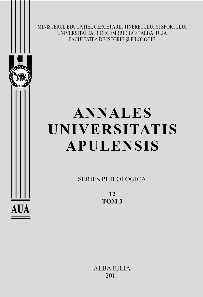Personajul adolescentului, pivot al liberalizării configuraţiei distopice
The Character of the Adolescent, a Pivot of the Liberalization of the Dystopian Configuration
Author(s): Iuliana SavuSubject(s): Literary Texts
Published by: Universitatea »1 Decembrie 1918« Alba Iulia
Keywords: utopia; dystopia; liberalization; poetic licence; teenager protagonist; postmodernism.
Summary/Abstract: Unlike their forerunner H. G. Wells, the classics of dystopian fiction (Yevgeny Zamyatin, Aldous Huxley, George Orwell) create worlds which are literally living hells. Be it accidental or voluntary, the access to such a place, as well as the retreat that was itself a sign of refusal, is now way behind, that is to say, off. In order to achieve the effects readers have grown familiar with, and which have already been transcribed as characteristics of dystopia, the representatives of the literature of the kind simply give up the frame that used to enable a two-way trip, and thus the protagonist, no longer a visitor, but an inhabitant, is confined to the only given world. Taking into account merely these marks of the new configuration of literary utopia, one expects teenager characters to hardly ever play the main part in this type of fiction. First of all, such a cast is uncommon because, from a strictly theoretical perspective, its disadvantages seem to exceed its benefits. The children or teenagers’ characters are likelier to strike a chord with the readers, yet as a rule they are not also the ones to understand the system’s corruption and to dare fight it. Even in the diabolical version in which they are pictured in Nineteen Eighty-Four, namely as indoctrinated, unscrupulous and aggressive minors, their part is still an episodic one. Yet D. B. C. Pierre’s debut novel, Vernon God Little: A 21st Century Comedy in the Presence of Death, manages to develop a successful counter-argument to all these prejudices, wagering – it seems – precisely on the major disadvantages of the protagonist’s age (he is 15-16 years old). It is true that his lucidity and capacity to understand make him superior to nearly all the other characters in the book. However, they prove quite unhelpful under the circumstances of him being sensitive in the manner of Holden Caulfield and harassed in a way that recalls Brave New World, Nineteen Eighty-Four, and Lord of the Flies alike. Much less – given that, immediately after witnessing a crime, he becomes the main suspect and is then charged with it, tracked down, found guilty and he comes close to execution, while his entire life, past and present, is turned into the subject of a gigantic reality show. Should he survive and set the world back to normal, this only happens in the circumstances of the liberalizing of the dystopian pattern.
Journal: Annales Universitatis Apulensis. Series Philologica
- Issue Year: 12/2011
- Issue No: 1
- Page Range: 241-252
- Page Count: 11
- Language: Romanian

